Nine Indonesian crew stranded in Mozambique waters as legal dispute stalls repatriation - report
Small war in Cabo Delgado continues – By Joseph Hanlon
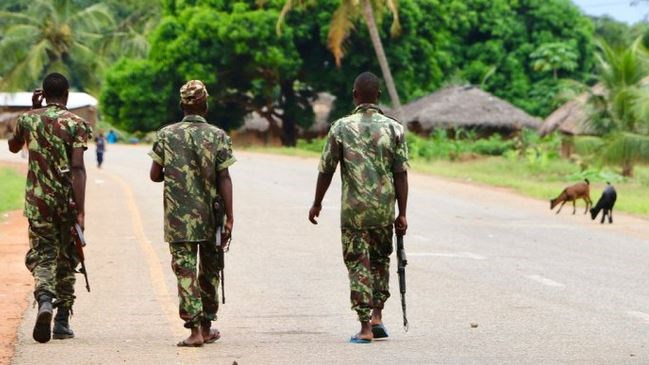
File photo: AFP
The insurgency in Cabo Delgado continues unabated:
+ There have been at least 9 attacks in the past three weeks, and insurgents are now attacking road traffic.
+ In the first report of retaliation, local people in Nangade decapitated two alleged insurgents.
+ Mozambique security forces have committed serious abuses in Cabo Delgado according to Human Rights Watch.
+ The unconstitutional secret trial of 189 people continues.
+ Police and government officials are now refusing to comment on Cabo Delgado attacks, so the only information comes from local media.
Carta de Mocambique, the new newsletter of Marcelo Mosse (6 Dec, https://www.cartamz.com), calculates that since the first attack on 5 October 2017, there have been 45 attacks, with 194 dead and 342 injured, and 750 houses sacked and/or burned. The attacks are in seven district of Cabo Delgado province, Mocimboa da Praia, Palma, Macomia, Quissanga, Ilha do Ibo, Balama and Nangade. Zitamar has an excellent interactive map with details of 59 attacks: https://zitamar.com/aswj-attack-locations/ Other estimates of dead range from 162 “confirmed” but excluding some killed by the military (Zitamar) to 203, including 123 civilians, 18 members of security forces and 62 militants. (Haysom, below).
Several attacks have been reported in recent days. (Carta 4,7,9,10 Dec, 27,28 Nov; Pinnacle News 8 Dec; AIM 4 Dec, 29 Nov; MediaFax 4 Dec, 29 Nov) These include three attacks on road traffic:
+ On 2 December, a tractor and trailer was ambushed near Machava, Nangade. The tractor was owned by the Nangade district administration and was carrying cashew to market. Three or four people were killed, including the driver from the Nangade administration, who was decapitated.
+ Two young men on a motorbike in Pundanhar, Palma were ambushed by two men on Tuesday 4 December; one of those on the bike was able to escape, but the other was decapitated.
+ On 23 November a lorry driven by a guard in the Niassa governor’s office was attacked just after it crossed the Ruassa river from Niassa into Balama, Cabo Delgado, and the driver was killed.
As well as attacks on road traffic, attacks on villages continued:
+ On 23 November, Chicuaia Velha, Nangade was attacked with 12 villagers killed and 40 houses burned. (See Human Rights Watch report, below.)
+ on 27 November Nacotuco, Macomia was attacked with one person killed, one injured, and a motorbike and pickup truck burned.
+ On 30 November the Natchundi farm centre, Mocimboa da Praia, was attacked. Four people were killed and stored crops were burned.
+ On 2 December Njama, a village near Natchundi, was attacked with houses burned but no one killed or injured.
+ On Thursday 6 December insurgents attacked the village of Cogolo, Macomia, killing one person, burning six houses, and taking goods from a market stall. There has been a military base in the village, but it had been moved three days before the attack. Earlier, some youths associated with the insurgency had built a hut in Cogolo which they used as a mosque. Angry local people destroyed this hut because they said it was used to spread messages inciting violence.
+ On early Wednesday morning 5 December insurgents destroyed 60 houses in Lilongo village. There were no dead or injured, but people lost food, clothing and animals.
Like a ‘Western” movie
The attacks are not going unchallenged. Two hours after the 5 December attack on Lilongo, local people from five villages, communicating by mobile phone and armed with machetes and knives, gathered into a “posse” (as in a Western movie) and pursued the attackers. Two suspected participants were captured and decapitated.
One of those decapitated, Fazil Chungu, came from Litingina villages and was suspected of being the guide to murderous incursions. His arm was cut off and carried into the village and displayed in front of Chungu’s family’s house. The posse also destroyed 17 houses of alleged relatives of insurgents and those suspected of belonging to rebel groups.
The posse also captured Mustafa Suale Machinga, who had been shot and injured by the army on 5 December and was abandoned by his comrades when they fled the base. He is about 30 years old, completed secondary school, served in the army, and had been in Maputo. Local people say he returned to Nangade a year ago and eventually joined the insurgents. (Carta de Mocambique (6, 10 Dec)
Two other examples of recent resistance have been reported. On 1 December Fifth Congress village, Nangade, was attacked. There was a militia with three guns who fought the attackers, but two militiamen were killed and 17 houses burned. (MediaFax & AIM, 4 Dec)
An army patrol assisted by young men from Chukulwa village, Mocimbia da Praia, went hunting suspected insurgents and killed 7 men on 7 December. (Pinnacle News 8 Dec)
Unconstitutional secret trial continues
The secret trial of 189 people which began 3 October continues. A trial behind closed doors violates of the Mozambican constitution which states that trials are public.
The accused include 157 Mozambicans, 29 Tanzanians, and 3 Somalis. So far the court has questioned 114 of the accused.
Because jails are badly overcrowded, only those accused of the most serious offences were kept in detention; 70 were allowed to await trial at home and all have absconded, admitted the spokesperson for the Cabo Delgado provincial court, Zacarias Napatima. They will be tried in absentia.
The prosecution case is that members of the group were recruited in local mosques by Tanzanians who promised them large sums of money if they successfully incited people in Cabo Delgado to disobey Mozambican state institutions. Charges include murder, use of banned weapons, membership of a criminal association, and instigation of collective disobedience against public order. (AIM En 4 Dec)
Human Rights Watch accuses army of ‘serious abuses’
“Security forces have allegedly arbitrarily detained, ill-treated, and summarily executed dozens of people they suspected of belonging to an armed Islamist group,” reported Human Rights Watch (HRW) on 4 December. “The security forces should be protecting the people in Cabo Delgado, not abusing them.”
HRW said: “Two soldiers in Macomia district confirmed killing suspects, but would not give details, fearful of being identified. One said that they had received ‘orders from their superiors’ to eliminate the ‘bandits’. He said he understood those words to mean that they should ‘kill them whenever it is possible.’ A third soldier shared photos of corpses of alleged insurgents that were extrajudicially executed during an operation in Nangade district on November 13.”
The report tells the story of two young farmers arrested together with an alleged Islamic religious leader in Palma and eight other men on 18 August. The detainees were taken to military barracks in Mocimboa da Praia district and questioned overnight. HRW reports: “’There were many others there,’ said one of the detainees, a 23-year-old farmer. ‘We were all told to remove our shirts and sit on the floor. The soldiers would come and take us one by one to the forest, and then we would hear gunshots followed by screaming. Some of them did not come back.’ A 25-year-old farmer also said that several of the detainees were taken outside, gunshots and screams followed, and the men never returned. The two men said they were released the next morning. Two others from the group were later transferred to Pemba and are facing trial for state security crimes.”
The report is on https://www.hrw.org/news/2018/12/04/mozambique-security-forces-abusing-suspected-insurgents
Carta de Mocambique (4 Dec) reports that in Palma, the problem is the police and military rather than insurgents. After 9 pm, police and military harass people on the street and demand money. On 30 November an employee of the Mundial construction company was shot and killed by police, Carta said.
Islamists recruited by filling the development gap with jobs and loans – but some beheaded for defaulting
The Islamic insurgency is “a movement that has slowly built a resilient and diverse economic base in Mozambique, recruiting young men not only through the offer of wages or bounty but by providing them with capital to enter into both the illicit and licit economies,” explains an excellent report by Simone Haysom of the Global Initiative Against Transnational Organized Crime, published 25 October and available on https://globalinitiative.net/northern_mozambique_violence/
Young men were offered money, direct employment or bursaries in exchange for joining the movement. However “early leaders of ‘Al Shabaab’ had first begun to recruit young people into their mosques and madrassas (rather than an armed movement) with the offer of business loans. These loans could be invested in any sector of their interest and all new adherents to the sect moved into business. Some of them bought new boats for fishing, some started small shops selling food and consumer goods, and others established themselves as car-repair men or vendors of building materials or electrical tools. Some new members invested in entering the illegal mining trade or smuggling.”
“Many men who took loans from ‘Al Shabaab’ did not know what exactly they were getting themselves into. When the call came, one of things that was required of recruits was that they sell the new assets they had acquired, presumably to fund the attacks that began in October [2017]. In the week before the Mocímboa firefight, young men across the towns of Cabo Delgado sold their stock, stores and houses and left their homes to travel to Mocímboa da Praia. Not everyone was prepared to do this, however. Our information is that Al Shabaab’s recruiters were vague about the conditions attached to their loans. Young men were told that the loans were interest-free and could be invested however recipients saw fit – but when the movement called on them for help, they were obliged to answer. Those who held on to their assets without the movement’s permission, and without joining the fight or paying their dues, are now being targeted. This is why attacks on whole villages result in only a few deaths; the men who have defaulted are beheaded – and if they cannot be found, family members are made to pay the price,” Haysom writes.
“The illicit economy is indistinguishable from the local economy in areas where smuggling is prevalent,” Haysom notes. “Illicit trades – ranging from wildlife poaching and drug trafficking to artisanal mining and human smuggling – have fostered corruption and undermined state legitimacy, provided livelihoods and local investment where the licit economy has not, and kept borders porous and the coastline unmonitored. Political figures, the ruling party and their elite criminal associates have openly benefited from both the licit and illicit extraction of natural resources, while the local community has often been punished for their involvement in informal illicit economies and denied the benefits of formal investment and economic growth. Into this crucible of resentment, extremists have stepped, offering opportunities for study and capital, and mobilizing their recruits to challenge violently the existing power relations.”
She concludes: “Illicit trade has also fostered corruption in the north and, in this way, has played a vital role in the breakdown of law and order, which has allowed the insurgency to establish itself locally and across the region.”
The heroin trade is part of that illicit trade, and it was the subject to a report by the editor of this newsletter earlier this year, available on: http://bit.ly/Moz-heroin
There are no jobs, so don’t be fooled
Don’t be enticed by false promises of jobs in Cabo Delgado, warned President Filipe Nyusi in a speech in Memba, Nampula, on 8 December. (AIM 9 Dec) Memba is one of the poorest districts and the President is in effect admitting that with little development and no jobs, it is easy for Islamic militants to recruit young men with the promise of work.
By Joseph Hanlon


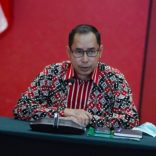
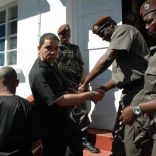
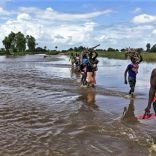


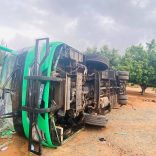




Leave a Reply
Be the First to Comment!
You must be logged in to post a comment.
You must be logged in to post a comment.